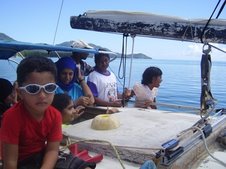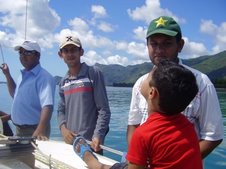Fact box: Missile shield
|
George W. Bush is doing it again - dragging the world towards another conflagration. He fired the first shot, paving the way for the possible return of the Cold War that had kept the world divided into two power blocs for four decades until the collapse of Communism in Eastern Europe in the early 1990s.
Is the Bush administration so naïve as to assume that Russia would not see the threat posed by the US moves to set up missile defence systems in the Czech Republic and Poland? A few years ago, when Sri Lanka wanted to buy hi-tech Chinese radars to beef up its air defence systems to counter the threat posed by the air wing of the Tamil Tiger guerrilla, India shot down the move and forced Colombo to accept an outdated Indian radar system as a gift. The reason: India did not want the Chinese to come to Sri Lanka with powerful radars and pry into what was going on in Indian airspace. The radar equipment the United States will install in the Czech Republic will be much more powerful than what Sri Lanka was to buy from China.
Russia's angry reaction to the US missile defence system is totally justified. The United States assures that the missile defence shield is not targeted against Russia but against rogue states such as Iran and North Korea. But in terms of realpolitik, such assurances mean very little. If the United States is keen on intercepting Iranian or North Korean missiles, it should have first discussed the matter with Moscow since the US plan posed a threat to Russia's national security.
In an imaginary world of only two states which co-exist peacefully while maintaining balance of power, if one state suddenly adds more weapons to its arsenal, obviously the other will feel insecure. This will certainly set off an arms race which will continue until balance of power is restored.
Arms race: The cost
During the Cold War era — from early 1950s to early 1990s - the US-led Western bloc and the Soviet Union-led Communist bloc were engaged in a senseless arms race at the cost of the welfare of the people who inhabited the world. Arms races feed mutual suspicion and thus contribute to the build-up of tension or even lead to war. If a country reduces its defence expenditure, the money saved could be used for the welfare of its citizens, improve the country's infrastructure or the advancement of science.
A country that eventually wins the arms race becomes arrogant and wants to dominate the rest of the world, interpreting its intervention in the affairs of other countries in terms of national interest. Such a country refuses to believe that war is morally wrong.
The United States under the Bush administration is not the first country to fit this description. History is replete with examples that show the winner of arms races becoming aggressor.
But the advocates of America's missile defence shield may argue that war preparedness is war prevention. E. H. Carr in his book 'Twenty-Year Crisis: 1919-1939' advises policymakers not to be carried away by ideal norms which have not been tested or proved to be useful. He finds faults with the utopian international order - which was advocated by US President Woodrow Wilson and which existed from the end of the First World War to the beginning of the Second. As diplomats and scholars during this period believed in idealism or utopianism based on moral values, power politics was ignored. The man who thought in terms of power-politics was Hitler, while other European powers and the United States dreamt of a just world based on international law. Hitler's rise was largely due to the failure of his European rivals and the United States to nip in the bud the threat posed by the Nazis.
Since the end of the Second World War, the United States foreign policy has been guided by those who put power politics before moral values. They advised that moral values should be pursued in international relations only if such an approach helps increase US power and serves its national interest. So it is not surprising that the United States is coming to the neighbourhood of Russia, a nuclear power, ostensibly to counter the threats posed by Iran and North Korea.
In response to the US missile defence shield, Russia last week test fired a ballistic missile with multiple warheads. A missile with multiple warheads is difficult to intercept. Russian President Vladimir Putin at this week's G-8 summit in Germany told Bush that Russia was unhappy over the US decision to install a missile detection radar system in the Czech Republic and interceptor missiles in Poland. He told Bush that they could, instead, share a radar station in Azerbaijan if the United States felt threatened by Iranian missiles and wanted to intercept them. Bush is reported to have said that he found the Russian proposal interesting. But analysts said it was unlikely that the United States would change its original plan.
The missile-defence crisis has brought US-Russian relations to its lowest ebb since the Cold War ended. Besides the missile-defence row, the two countries have been taking contrasting policy stances over a number of global issues. Russia is opposing a US-backed UN plan for independence for Kosovo, a Serbian region with an Albanian majority. Russia has criticized the United States' arms shipment to Lebanon to help the Fouad Siniora government fight the Islamic militants holed up in a Palestinian refugee camp. Russia has also hit back at US criticism at Putin's crack down against opposition figures in Russia. Washington also accused Russia of being a bully to its neighbours.
Russia is also smarting over the loss of its prestige as a superpower and Putin has not tried to hide his desire to make his country a force to be reckoned with in the international arena. The rise in oil prices has helped Russia to overcome its economic woes and made Putin confident that his goal of making the county a superpower once again is not unattainable.
Putin in an interview in February charged that the US was an imperialist power. He repeated the charge a week before his departure to the G-8 summit and said Washington was starting a new arms race by building a missile shield in Europe. Meanwhile, relations between Russia and Britain are also strained over the poison killing of former Russian spy Alexander Litveninko. Britain demanded that Russia extradite the prime suspect, former KGB agent Andrey Lugovoy, to face trial in London. But Lugovoy, backed by the Putin regime, told a news conference that Litvinenko was poisoned by British intelligence.
These developments point to a possible return of the Cold War. But it is unlikely that the present crisis will aggravate to the levels of what the world witnessed after the Second World War. The Cold War then was a clash between communism and capitalism and the two superpowers were backed by one country or another. The ground reality today is that despite the rhetoric, Russia has to catch up a great deal to become a military match to the United States.




No comments:
Post a Comment